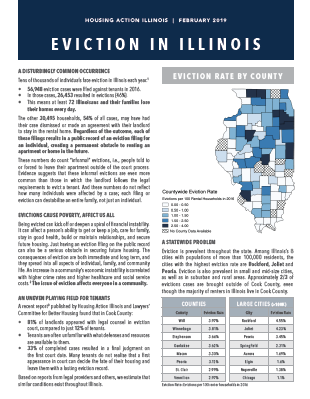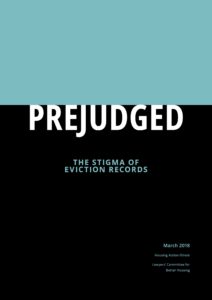Addressing Eviction
Eviction in Illinois during COVID-19
The Illinois state eviction moratorium is no longer in place. Based on Governor Pritzker’s most recent executive order, Executive Order 2021-23 (issued on September 17, 2021), the moratorium on law enforcement carrying out eviction orders against certain covered persons was in place through October 3, 2021, after which it was rescinded. This state moratorium remained in place despite the Supreme Court decision lifting the CDC national eviction moratorium on August 26, 2021. Read the National Low Income Housing Coalition’s statement on the Supreme Court decision here »
Eviction in Illinois
Tens of thousands of families and individuals face eviction in Illinois each year. 56,948 eviction cases were filed against Illinois tenants in 2016, and 46% of those case resulted in evictions.
This means at least 72 Illinoisans and their families lose their homes every day.
Being evicted can kick off or deepen a spiral of financial instability. It can affect a person’s ability to get or keep a job, care for family, stay in good health, build or maintain relationships, and secure future housing. Just having an eviction filing on the public record can also be a serious obstacle in securing future housing. The consequences of eviction are both immediate and long term, and they spread into all aspects of individual, family, and community life. An increase in a community’s economic instability is correlated with higher crime rates and higher healthcare and social service costs. The issue of eviction affects everyone in a community.
Although eviction is by no means a new problem, the publication in 2016 of Matthew Desmond’s heartbreaking, Pulitzer Prize-winning book, Evicted: Poverty and Profit in the American City, has sparked widespread interest in this issue. Desmond’s profiles of eight families struggling to keep their homes in Milwaukee, which he contextualizes with a wealth of data, illustrate two important conclusions:
People are primarily evicted because of poverty. Not paying rent is the result of not having adequate income.
Evictions are not just the result of poverty; they are a cause of poverty. Experiencing an eviction can lead to a cycle of financial insecurity, job loss, family instability, and homelessness.
Eviction is prevalent throughout Illinois. Among Illinois’s eight cities with populations of more than 100,000 residents, the cities with the highest eviction rate are Rockford, Joliet and Peoria. Eviction is also prevalent in small and mid-size cities, as well as in suburban and rural areas. Approximately two-thirds of evictions cases are brought outside of Cook County, even though the majority of renters in Illinois live in Cook County.

Why Racial Justice Matters
Evictions disparately impact Black communities, especially Black women and families. In 2017, 23 of the 25 community areas in Chicago with the highest eviction filing rates were majority Black Community Areas. Majority Black areas had eviction filing rates two to four times higher than majority Latinx or White areas.
Eviction is a cause, not just a condition, of poverty.
Research & Publications
Eviction in Illinois
 Eviction is prevalent throughout Illinois. This policy issue brief by Housing Action Illinois, published in February 2019, explores county-level eviction data. Key findings include:
Eviction is prevalent throughout Illinois. This policy issue brief by Housing Action Illinois, published in February 2019, explores county-level eviction data. Key findings include:
- 56,948 eviction cases were filed against Illinois tenants in 2016.
- In those cases, 46% resulted in evictions, indicating that more than 72 Illinoisans and their families lose their homes every day.
- 54% of households did not have a negative determination against them but still ended up with an eviction filing on the public record that may be a serious obstacle to finding a future home.
Prejudged: The Stigma of Eviction Records
 This report by Housing Action Illinois and the Lawyers’ Committee for Better Housing, published in March 2018, explores how an eviction filing on the public record is a serious obstacle to finding housing for people whose cases did not result in them actually getting evicted. This is true even in cases where the tenant didn’t violate their lease in any way. Prejudged: The Stigma of Eviction Records shows that 39% of eviction cases filed in Cook County during the past four years did not result in an eviction order and/or other judgment against the tenant. We estimate more than 15,000 people in Cook County each year ended up or will end up with a public eviction record when they never received a judgment against them in eviction court or were actually evicted.
This report by Housing Action Illinois and the Lawyers’ Committee for Better Housing, published in March 2018, explores how an eviction filing on the public record is a serious obstacle to finding housing for people whose cases did not result in them actually getting evicted. This is true even in cases where the tenant didn’t violate their lease in any way. Prejudged: The Stigma of Eviction Records shows that 39% of eviction cases filed in Cook County during the past four years did not result in an eviction order and/or other judgment against the tenant. We estimate more than 15,000 people in Cook County each year ended up or will end up with a public eviction record when they never received a judgment against them in eviction court or were actually evicted.
What Have We Been Doing?
- Since the onset of the COVID-19 pandemic, preventing evictions and mitigating the fallout of people losing their homes has been a major priority for Housing Action. In 2023, we are advocating alongside partners for expanding access to eviction record sealing through state legislation—identical bills to be filed in the House and Senate for the 2023 General Assembly Session. Learn more and endorse here »
- We advocated successfully for the COVID-19 Emergency Housing Act, which included a variety of temporary key provisions to help prevent eviction and expand access to sealing eviction records. Read our breakdown of the legislation here. Unfortunately, these sealing provisions were not extended and sunset during 2022.
- Since the onset of the pandemic, we have also been active in advocating for federal and state funding for emergency rent assistance to keep people in their homes. We advocated alongside the National Low Income Housing Coalition for more than $12 billion in funding for HUD, which was included in the federal CARES Act passed by Congress in March 2020. Illinois communities were allocated $332.6 million of the funding for HUD programs. These funds are being used to serve the basic human needs of people experiencing homelessness, renters, homeowners, and others impacted by the pandemic.
- The final FY2021 Illinois state budget includes $310 million in COVID-19–related rent and mortgage assistance—the largest commitment of federal Coronavirus Relief Fund dollars from the CARES Act for housing assistance by any state, and a critical win for Housing Action and the state of Illinois. Of this, at least $100 million was designated to meet the needs of people in the areas most impacted by COVID-19, which are disproportionately communities of color. In total, by the end of 2020, these funds will assist 42,000 renter households in maintaining their homes through a commitment of $210 million in funding.
- For a number of years, Housing Action Illinois has worked with partners to try to pass a measure that would expand access to sealing eviction records in Illinois. During 2019, we worked with the Lawyers’ Committee for Better Housing number to draft and advocate for House Bill 2299, sponsored by State Representative Delia Ramirez. We continued our advocacy in 2020 with House Bill 4911, again sponsored by Representative Ramirez, and Senate Bill 3158, sponsored by Senator Jaqueline Collins. Read the fact sheet »
- As a member of the national, multi-sector Opportunity Starts At Home coalition, Housing Action Illinois is urging legislators to pass the Eviction Crisis Act. This act will create new tools for addressing the issue at the national level by improving data, expanding efforts to reduce preventable evictions, and limiting the fallout when evictions do occur.
Learn More
- Evicted: Poverty and Profit in the American City
- The Eviction Lab
- Who Gets Evicted? Assessing Individual, Neighborhood, and Network Factors
- Housing, Poverty, and the Law
Eviction in Chicago
Lawyers’ Committee for Better Housing launched a data portal in May 2019 with detailed information on what eviction looks like in Chicago. Among other findings, the data shows that renters in majority Black neighborhoods in Chicago are four times more likely to face eviction than renters in majority White neighborhoods. Visit the data portal »
- New Data Reveals Impact of Being Lawyerless in Chicago Eviction Court
- South Shore is Chicago’s Eviction Capital
- Chicago: The Cost of Eviction and Unpaid Bills of Financially Insecure Families for City Budgets
Tenant Blacklisting & Record Screening
- Combating Tenant Blacklisting Based on Housing Court Records: A Survey of Approaches
- Online Court Records: Balancing Judicial Accountability and Privacy in an Age of Electronic Information
Resources for Tenants
- Renters’ Guide to Eviction Court
- Illinois Legal Aid Online